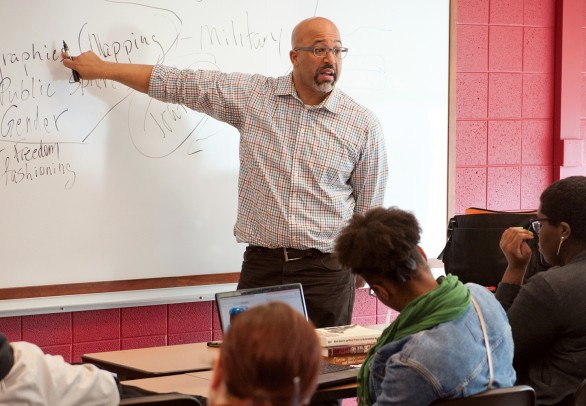Giving students a wider, more critical view of the world

“I learned to try to find a good balance between authoritative lecturing on the one hand and student-centered learning on the other,” Corey Capers says.
Photo: Roberta Dupuis-Devlin/UIC Photo Services
2013 Silver Circle Award
Since 1966, the Silver Circle has been presented to some of UIC’s best teachers. What makes the award especially meaningful is its selection committee: the graduating seniors.
Corey Capers
Assistant professor of history and African-American studies
College of Liberal Arts & Sciences
As an undergraduate at Southern Methodist University, Corey Capers benefited from professors who stretched the boundaries and stressed critical thinking.
Their question-based approach helped him develop a wider, more critical view of the world as he studied topics such as class, gender and post-colonial literature.
It serves as the foundation for his teaching today.
“I learned to try to find a good balance between authoritative lecturing on the one hand and student-centered learning on the other,” Capers says.
Race, gender, nationalism, popular culture and religion intersect within his courses in colonial American, U.S. and African-American history that cover the late 15th century to the end of the 19th century.
Capers, a first-time Silver Circle winner, expects his students to be intellectually curious and willing to challenge their preconceived notions.
“I try to get students to look at cultural changes that are not so obvious because they are accustomed to the political and social history,” he says.
“They know of groups and political institutions, but often the cultural part of that is really obscure.”
Capers, a UIC faculty member since January 2006, says “being open and vulnerable as opposed to performing my expertise in a way that is bulletproof” has been a key aspect of his instructional practice.
He directs his undergraduate classes in a similar manner to his graduate classes.
“The focus is to get students to be assertive with their ideas and insights and to accept that assertiveness is something that is risky, but worth it,” he explains.
“Students are often trained to want to know what the right answer is. I’m equally interested in how we get there and in what the right question is.”
